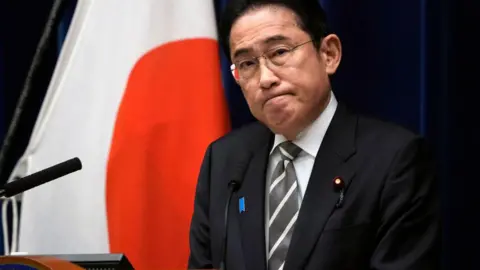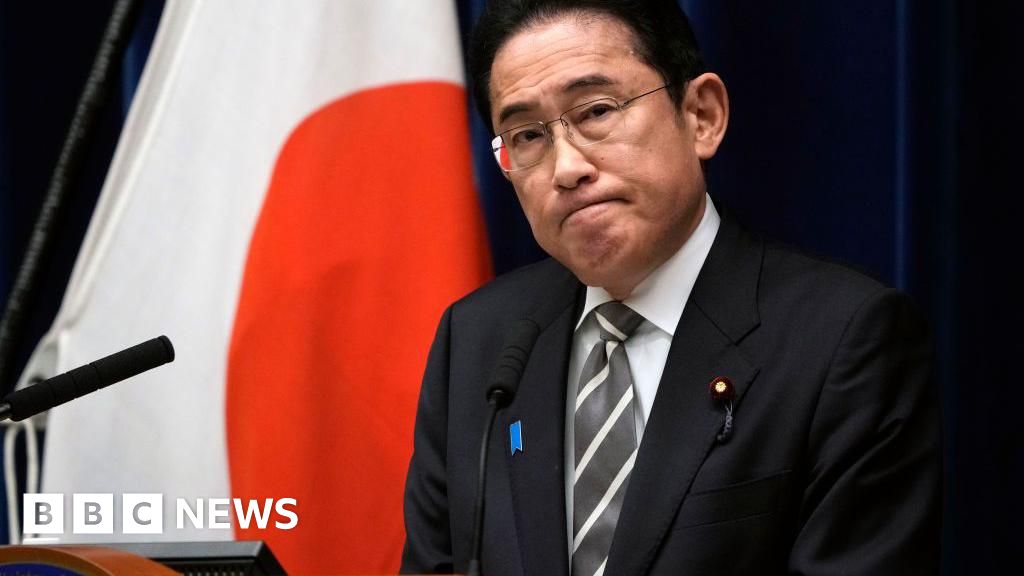 Getty Images
Getty ImagesJapanese Prime Minister Fumio Kishida will not seek re-election as leader of the ruling Liberal Democratic Party, saying the party needs a “new start.”
The 67-year-old Liberal Democratic Party veteran is expected to resign as prime minister after the Liberal Democratic Party elects a new leader in September.
Mr Kishida, who has been prime minister since 2021, has seen his approval ratings fall following a corruption scandal involving his party, rising living costs and a weaker yen.
Last month, his approval rating plummeted to 15.5%, the lowest level for a prime minister in more than a decade.
“In the upcoming presidential election, it is necessary to show people that the LDP will change,” Mr. Kishida said at a news conference announcing his decision on Wednesday.
“Transparent and open elections and free and open debate are important. The first understandable step to show that the LDP will change is for me to take a step back,” he said.
There are doubts within the party whether Mr Kishida can lead the LDP to victory in the next general election in 2025.
Still, LDP leaders were shocked by Mr. Kishida’s statement.
A senior leader told NHK he had tried to persuade Mr Kishida to run for office, but the prime minister said it was “irresponsible”.
A member of Mr Kishida’s party faction called the decision “very regrettable and unfortunate”, adding that the prime minister “has a good record in foreign policy, defense policy and domestic politics, but he was forced [step down] Due to political and money issues.
Analysts told the BBC that Japan is going through a “once in a generation” political crisis as the ruling party struggles to reshape its image.
Last December, Four LDP cabinet ministers resign within two weeks A fundraising scandal involving the ruling party’s most powerful faction.
Five senior deputy ministers and one parliamentary deputy minister from the same faction as late Prime Minister Shinzo Abe also resigned.
Japanese prosecutors have launched a criminal investigation into whether dozens of Liberal Democratic Party lawmakers benefited from fundraising activities that resulted in millions of dollars being hidden from official party records.
But Mr Kishida’s handling of the fundraising scandal has drawn public criticism, making him even more unpopular.
The controversy comes as Japanese households face the fastest food price surge in nearly half a century.
While the opposition is weak and divided, a combination of economic woes and political scandals have fueled distrust of the ruling party.
“The entire political situation will continue to change from now on,” Jun Azumi, a lawmaker from the main opposition Cadet Party, told NHK after Kishida’s announcement.
Who is Fumio Kishida?
Mr. Kishida comes from a family of politicians. His father and grandfather are both members of the Japanese House of Representatives.
He was first elected to the House of Representatives in 1993.
he Taking over as Prime Minister in October 2021He replaces Yoshihide Suga, who resigned after just one year in office.
Over the past three years, Kishida’s government has pushed for policies to boost wages and household incomes amid tightening living costs.
He oversaw Japan’s reopening after the Covid-19 pandemic and lived through one of Japan’s most shocking political moments – Former Prime Minister Shinzo Abe was assassinated July 2022. State funeral for slain leader.
Although Mr. Kishida is in dire straits at home, his diplomacy often makes headlines.
Japan has long been a key U.S. ally in the tense Indo-Pacific region, which faces an assertive China and a nuclear-armed North Korea. Mr. Kishida succeeded in expanding the country’s military budget and carefully abandoned his postwar pacifist ideals.
Defense cooperation with Washington deepens Under his administration, he also repaired relations with South Korea, A historic visit to receive President Yoon Seok-yeol in Tokyo.
In another unprecedented move, Japan, the United States and South Korea issued a joint statement at last August’s Camp David summit calling for expand cooperation between them.
Additional reporting by Chika Nakayama in Tokyo


